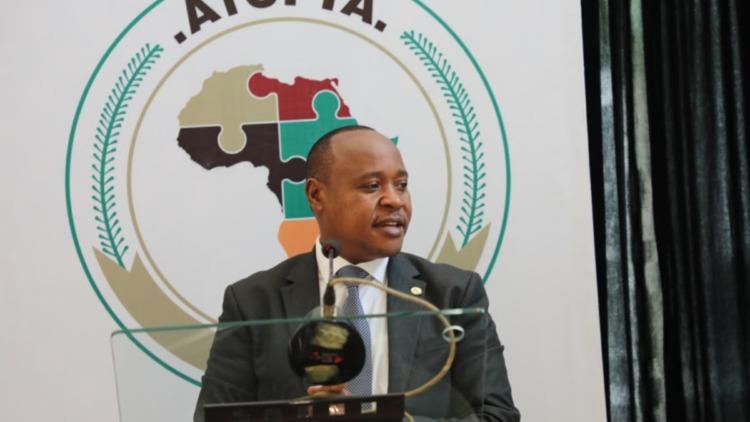The East African Community (EAC) Secretary General Peter Mathuki has urged the African Continental Free Trade Area (AfCFTA) Secretariat to adopt an integration approach that is people-centred, market-driven and private sector-led to ensure African citizens benefit from the continental agreement.
Speaking in Accra, Ghana, during the first coordination meeting of Heads of Regional Economic Communities (RECs) on the implementation of the AfCFTA, Dr. Mathuki noted, AfCFTA, with a promising market of around 1.3 billion consumers and a GDP of 3.4 trillion US dollars, promises to unlock many opportunities beneficial to African’s citizens.
“There is an urgent need for citizen sensitization and regular capacity building activities at national and regional levels, to inform African citizens on issues around the continental agreement and how they can benefit from it,” he said.
Dr. Mathuki expressed that this could be achieved through deepening collaboration between AfCFTA Secretariat, Regional Economic Blocs Secretariats such as the EAC or Common Market for East and Southern Africa (COMESA) and the Regional Economic Blocs Business Councils such as the East African Business Council (EABC).
Read: Is Kenya abandoning trading blocs’ agreements for the US?
“Establishing structured dialogue frameworks while engaging the private sector, civil societies and other groups at different levels of policy formulation, will ensure the agreement is embraced and its gains trickle down to Africans,” he added.
The AfCFTA is the largest trade agreement, by composition of countries enjoined, since the formation of the World Trade Organization. Currently, 54 out of the 55 African countries have signed the AfCFTA, with 41 having ratified it.
The agreement is set to ultimately open up the African market to trade freely, will boost intra-African trade and trigger structural transformation with the goal of reducing poverty.
“The scorecard of the achievements of AfCFTA will be on increased trade and investment in the region. Africa should thus speak in one voice devoid of political interest, to deepen integration which will ultimately result in economic growth,” the EAC Secretary-General noted.
Dr. Mathuki called upon RECs’ Business Councils to focus on building political goodwill for the implementation and enforcement of the AfCFTA.
“The Business Councils in various regional economic bloc should prioritize building private sector to private sector consensus so as to speak in one voice and fast track decision making,” he said.
The EAC chief also called on the development of a simplified trade regime for the AfCFTA and the development of continental standard operating procedures on border agency cooperation.
Read: African countries urged to approach infrastructural projects jointly
Secretary-General of the AfCFTA Secretariat, Wamkele MENE noted that the mandate of AfCFTA Secretariat is to coordinate the implementation of the AfCFTA, while ensuring close collaboration with all key stakeholders namely the State Parties, the Secretariats of RECs, the business community and strategic partners.
“Regional Economic blocs are the building blocs of the AfCFTA and thus we are keen on closely collaborating with all. We are also keen on involving the private sector as it is a very strong pillar and catalyst for industrialization in the continent,” he noted.
The meeting was preceded by preparatory Technical Meetings held on 18th to 19th September on a hybrid format to develop actionable strategies to enhance the effective implementation of the AfCFTA, drawing on lessons from the implementation of RECs’ Free Trade Areas (FTAs).
The eight RECs recognized by the African Union were represented at the Meeting; Arab Maghreb Union (UMA), Common Market for Eastern and Southern Africa (COMESA), Community of Sahel-Saharan States (CEN-SAD), Economic Community of Central African States (ECCAS), East African Community (EAC), Economic Community of West African States (ECOWAS), Intergovernmental Authority on Development (IGAD) and Southern African Development Community (SADC).
Customs Unions that also participated in the Meeting include the Southern Africa Customs Union (SACU) and the West Africa Economic and Monetary Union (UEMOA).
Business Councils and associations in attendance were; the African Business Council (ABC), AfroChampions, East African Business Council (EABC), COMESA Business Council (CBC), Federation of West Africa Employers Association (FOPAO) and the Federation of West African Chambers of Commerce and Industry (FEWACCI).
